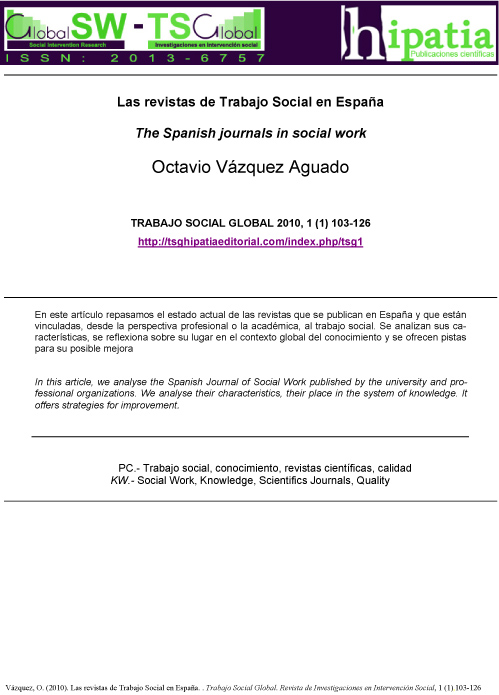[es] Los conocimientos en trabajo social: elogio del eclecticismo
DOI:
https://doi.org/10.30827/tsg-gsw.v1i1.902Palabras clave:
Values, duties, quality of life, moral dilemmas, professional identity. // conocimiento, trabajo social, eclecticismo, constructivismo, formación.Resumen
La ciencia está en el origen del trabajo social. En efecto, el objetivo que perseguía Mary Richmond al conceptualizar la disciplina de trabajo social consistía en reemplazar las creencias religiosas por un enfoque racional. Así pues, el conocimiento científico se inscribe en el corazón del trabajo social desde el principio. Dicho esto, las grandes teorías son menos útiles en la práctica de una profesión cuya finalidad es ayudar a las personas que viven las situaciones más diversas. Esta es la razón por la cual el trabajo social se construye a partir de una base ecléctica: el trabajador social eficaz toma de un vasto conjunto de nociones, en apariencia dispares, aquellas que mejor se adaptan a la situación. Ahora bien, ¿cómo enseñar este conocimiento práctico a los estudiantes de trabajo social? Este artículo trata de estas cuestiones y propone algunas pistas de reflexión.
Science is closely related to social work, from its very origin. In fact, with the conceptualization of social work, Mary Richmond’s objective was to replace religious beliefs by a more rational approach. Thus, right from its beginning, the scientific knowledge was at the core of social work. This being said, grand theories are less appropriate to the practice of social work because this profession deals with persons living in particular situations. That is why social work is built upon an eclectic basis : social worker has to draw from a vast array of notions and theories to borrow bits and pieces which will help to explain and attenuate problem experienced by persons. Now, this practical knowledge can be taught to students in social work? This article deals with these questions and proposes some reflections.
Descargas

Descargas
Publicado
Cómo citar
Número
Sección
Licencia
Las personas autoras que publican en esta revista están de acuerdo con los siguientes términos:
- Las personas autoras conservan los derechos de autoría, garantizando a Trabajo Social Global-Global Social Work el derecho a la primera publicación del trabajo que remiten a la revista para que sea sometido al preceso editorial.
- Autores y autoras conocen que su obra se publica bajo una Licencia Creative Commons que permite a otros compartirla con un reconocimiento de la autoría del trabajo y de su publicación inicial en esta revista.
- Los/as autores/as ceden a Trabajo Social Global-Global Social Work los derechos de explotación de la obra que haya sido publicada en esta revista, autorizando a la Editorial de la misma para el ejercicio de una libre reproducción, distribución y comunicación pública. Autores y autoras conocen que su obra será almacenada en servidores y reproducida en soporte digital para su incorporación a repositorios institucionales y bases de datos que facilitarán el acceso libre y gratuito al texto completo de la obra.
- Los/as autores/as pueden distribuir la versión post-print de la obra publicada en TSG-GSW (por ejemplo, situarlo en un repositorio institucional o publicarlo en un libro), con un reconocimiento expreso de su publicación inicial en esta revista.
Los derechos de copyright sobre los textos publicados en Trabajo Social Global-Global Social Work, así como la política editorial de la misma respecto al auto-archivo o depósito en repositorios institucionales o temáticos, están identificados en la base de datos Dulcinea.





















